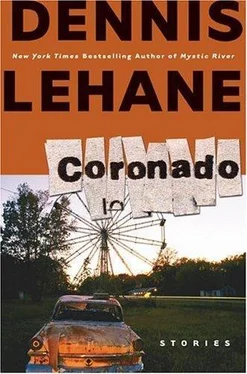You’d been here peddling hurricane insurance in trailer parks when word got around that someone had found one as big as a casino chip. Miner by the name of George Brunda suddenly buying drinks, talking to his travel agent. You and Gwen shot pool with him one night, and you could see it in the bulges under his eyes, the way his laughter exploded — too high, too fast, gone chalky with fear.
He didn’t have much time, old George, and he knew it, but he had a mother in a rest home, and he was making the arrangements to get her transferred. George was a fleshy guy, triple-chinned, and dreams he’d probably forgotten he’d ever had were rediscovered and weighted in his face, jangling and pulling the flesh.
“Probably hasn’t been laid in twenty years,” Gwen said when George went to the bathroom. “It’s sad. Poor sad George. Never knew love.”
Her pool stick pressed against your chest as she kissed you and you could taste the tequila, the salt, and the lime on her tongue.
“Never knew love,” she whispered in your ear, an ache in the whisper.
“What about the fairground?” your father says as you leave the office of True-Line Efficiency Experts Corp. “Maybe you hid it there. You always had a fondness for that place.”
You feel a small hitch. In your leg, let’s say. Just a tiny clutching sensation in the back of your right calf, but you walk through it, and it goes away.
You say to your father as you reach the car. “You really drive her home this morning?”
“Who?”
“Mandy?”
“Who’s…?” Your father opens his door, looks at you over it. “Oh, the whore?”
“Yeah.”
“Did I drive her home?”
“Yeah.”
Your father pats the top of the door, his denim jacket flapping around his wrist, his eyes the blue of bullet casing. You feel, as you always have, reflected in them, even when you aren’t, couldn’t be, wouldn’t be.
“Did I drive her home?” A smile bounces in the rubber of your father’s face.
“Did you drive her home?” you say.
That smile’s all over the place now, the eyebrows too. “Define home.”
You say, “I wouldn’t know, would I?”
“You’re still pissed at me because I killed Fat Fuck.”
“George.”
“What?”
“His name was George.”
“He would have ratted.”
“To who? It wasn’t like he could file a claim. Wasn’t a fucking lottery ticket.”
Your father shrugs, looks off down the street.
“I just want to know if you drove her home.”
“I drove her home,” your father says.
“Yeah?”
“Oh, sure.”
“Where’d she live?”
“Home,” he says and gets behind the wheel, starts the ignition.
You never figured George Brunda for smart, and it was only after a full day in his house, going through everything down to the point of removing the drywall and putting it back, touching up the paint, resealing it, that Gwen said:
“Where’s the mother stay again?”
That took uniforms, Gwen as a nurse, you as an orderly, Gentleman Pete out in the car while your father kept watch on George’s mine adit and monitored police activity over a scanner.
The old lady said, “You’re new here and quite pretty,” as Gwen shot her up with phenobarbital and Valium and you went to work on the room.
This was the glitch — you’d watched George drive to work; watched him enter the mine. No one saw him come back out again, because no one was looking on the other side of the hill, the exit of a completely different shaft. So while your father watched the front, George took off out the back, drove over to check on his investment, walked in the room just as you pulled the rock from the back of the mother’s radio, George looking politely surprised, as if he’d stepped into the wrong room.
He smiled at you and Gwen, held up a hand in apology, and backed out of the room.
Gwen looked at the door, looked at you.
You looked at Gwen, looked at the window, looked at the rock filling the center of your palm, the entire center of your palm.
Looked at the door.
Gwen said, “Maybe we—”
And George came through the door again, nothing polite in his face, a gun in his hand. And not any regular gun, a motherfucking six-shooter, like they carried in westerns, long, thin barrel, a family heirloom maybe, passed down from a great-great-great-grandfather, not even a trigger guard, just the trigger, and crazy fat fucking George the lonely unloved pulling back on it and squeezing off two rounds, the first of which went out the window, the second of which hit metal somewhere in the room and then bounced off that and then the old lady went, “Ooof,” even though she was doped up and passed out, and it sounded to you like she’d eaten something that didn’t agree with her. You could picture her sitting in a restaurant, halfway through coffee, placing a hand to her belly, saying it: “Ooof.” And George would come around to her chair, say, “Is everything okay, Mama?”
But he wasn’t doing that now, because the old lady went ass-over-teakettle out of the bed and hit the floor and George dropped the gun and stared at her and said, “You shot my mother.”
And you said, “ You shot your mother,” your entire body jetting sweat through the pores all at once.
“No, you did. No, you did.”
You said, “Who was holding the fucking gun?”
But George didn’t hear you. George jogged three steps and dropped to his knees. The old lady was on her side, and you could see the blood, not much of it, staining the back of her white johnny.
George cradled her face, looked into it, and said, “Mother. Oh, Mother, oh, Mother, oh, Mother.”
And you and Gwen ran right the fuck out of that room.
In the car, Gwen said, “You saw it, right? He shot his own mother in the ass.”
“He did?”
“He did,” she said. “Baby, she’s not going to die from that.”
“Maybe. She’s old.”
“She’s old, yeah. The fall from the bed was worse.”
“We shot an old lady.”
“We didn’t shoot her.”
“In the ass.”
“We didn’t shoot anyone. He had the gun.”
“That’s how it’ll play, though. You know that. An old lady. Christ.”
Gwen’s eyes the size of that diamond as she looked at you and then she said, “Ooof.”
“Don’t start,” you said.
“I can’t help it. Bobby, Jesus.”
She said your name. That’s your name — Bobby. You loved hearing her say it.
Sirens coming up the road behind you now and you’re looking at her and thinking this isn’t funny, it isn’t, it’s fucking sad, that poor old lady, and thinking, Okay, it’s sad, but God, Gwen, I will never, ever live without you. I just can’t imagine it anymore. I want to… What?
And the wind is pouring into the car, and the sirens are growing louder and there are several of them, an army of them, and Gwen’s face is an inch from yours, her hair falling from behind her ear and whipping across her mouth, and she’s looking at you, she’s seeing you — really seeing you; nobody’d ever done that; nobody — tuned to you like a radio tower out on the edge of the unbroken fields of wheat, blinking red under a dark blue sky, and that night breeze lifting your bangs was her, for Christ’s sake, her, and she’s laughing, her hair in her teeth, laughing because the old lady had fallen out of bed and it isn’t funny, it isn’t and you’d said the first part in your head, the “I want to” part, but you say the second part aloud:
“Dissolve into you.”
And Gentleman Pete, up there at the wheel, on this dark country road, says, “What?”
But Gwen says, “I know, baby. I know.” And her voice breaks around the words, breaks in the middle of her laughter and her fear and her guilt and she takes your face in her hands as Pete drives up on the interstate and you see all those siren lights washing across the back window like Fourth of July ice cream and then the window comes down like yanked netting and chucks glass pebbles into your shirt and you feel something in your head go all shifty and loose and hot as a cigarette coal.
Читать дальше












